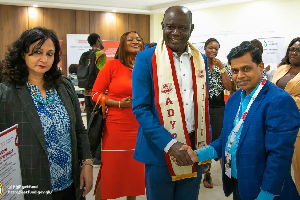ACCOUNTABILITY IN GHANAIAN PUBLIC UNIVERSITIES: A NECESSARY CONDITION FOR THE FUTURE OF THE UNIVERSITIES.
Accountability in higher education refers to colleges and universities being held responsible for using their resources in an efficient and effective manner in order to produce the best education possible at the most reasonable cost (Knight, 2003). According to Knight (2003), in many regards, accountability is a reaction to the traditional condition that the institutions of postsecondary education could not explain what they did with the money they received during the past year. All they knew was that they needed more money the following year. Such perceived responses are very difficult to understand for the business and professional people who constitute the higher education boards of trustees and university councils (in the case of Ghana). Such university council members or board of trustees tend to be accustomed to “bottom line” or profit-making environments and have difficulty understanding the lack of accountability measures in colleges and universities. The tendency, therefore, is to require that universities develop accountability measures. One wonders if university councils of Ghanaian public universities fall in this category. My earlier article on the subject which was published by Ghana web on February 24, 2008 sought to aim at the need for such a debate. This article is therefore a follow-up call to specific identifiable groups to also get involved in the debate. Accountability in this context is normally not financial, though that is sometimes touched upon in certain reporting activities. The type of accountability referenced here is less legalistic and performance oriented. The focus is more on performance auditing than on financial auditing. The former asks how well an institution spent the money, while the latter addresses whether or not one spent the money properly, i.e., within legal and other acceptable financial bounds. Only occasionally is a college or university accused of financial improprieties. Public universities in Ghana, for instance, may be guided by financial regulations aimed at reducing financial improprieties. Unfortunately, according to Knight (2003), accusations of mismanagement and instructional malfeasance are much more common in many colleges and universities.One approach is merging financial data with performance data to create efficiency measures of various sorts. There is a long history of developing measures such as costs per student credit hour; square footage of building per student credit hour; faculty/lecturers and staff members per headcount; and full-time equivalent student. The use of such measures has driven accountability in the sense that they have been employed to restrict institutional resource ambitions. For Ghanaian public universities, there may be a number of ways of evaluating accountability internally and externally. One common method is comparison: How are we doing compared to our closest competition or to our peers? Another method is trend analysis: How has the number of applicants to a program changed over time? Yet another approach uses targets: Have we reduced our costs by five percent as planned? Is this program as successful as the benchmark one at another institution? Accountability in higher education (especially in public universities) is hardly discussed in Ghana. The United States Secretary of Education pioneered the Spellings Commission Report which, among other things, seeks to address accountability in American higher education. Similarly, the Ghanaian Minister of Education, Science and Sports could begin to have issues of accountability in Ghanaian public universities as a priority. The National Council for Tertiary Education and most importantly, university councils, may be expected to be more concerned with accountability in Ghanaian public universities. This in my opinion will increase efficiency in the public universities. Again, Ghana’s National Accreditation Board can make issues of accountability one of its key criteria in reviewing the accreditation status of Ghanaian public universities. Since these institutions cherish their accreditation status, they will be compelled to use approved accountability measures in the governance of public universities in Ghana. Ghanaian public universities should begin to be seen as being more accountable to the public. I would expect identifiable groups in the public universities such as Vice Chancellors Ghana, University Teachers Association of Ghana (UTAG), Ghana Association of University Administrators (GAUA), Teachers and Education Workers Union (TEWU), and Federation of University Senior Staff Association (FUSSAG) to attempt making their members appreciate the need to get involved in the accountability debate. Student groups such as NUGS, the SRCs and
the JCRCs may begin to discuss issues of accountability within their respective student bodies to enable them have the moral courage to get involved in the accountability debate in their universities.
Finally, as we advocate for accountability measures in Ghanaian public universities, I wish to emphasize that the ultimate goal is to bring all stakeholders on board to offer workable recommendations to make Ghanaian public universities more accountable to the public with the hope of making our public universities more efficient in providing Ghana’s manpower needs. Let’s avoid destructive criticisms. Let’s embrace this debate and provide a good future for our public universities.
















